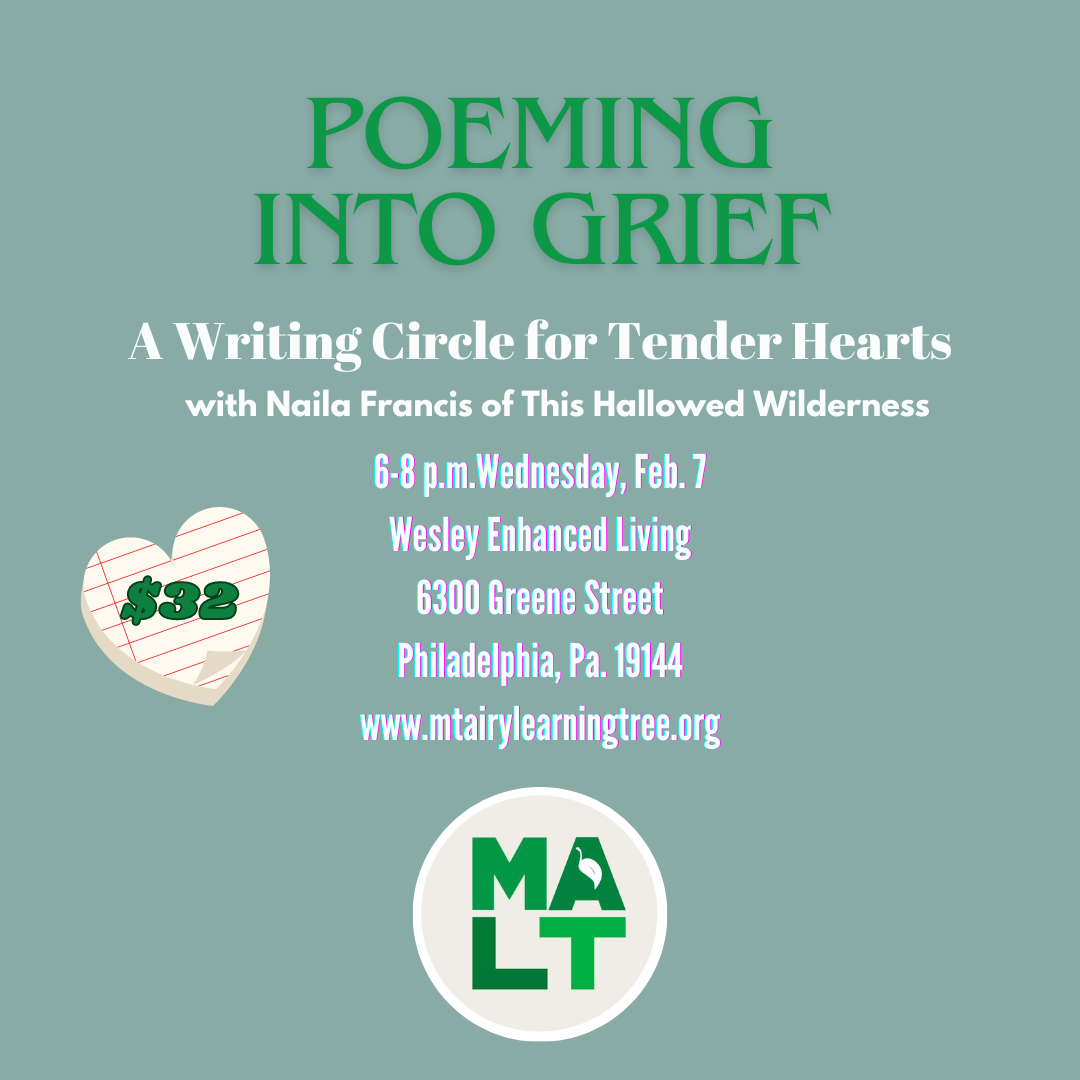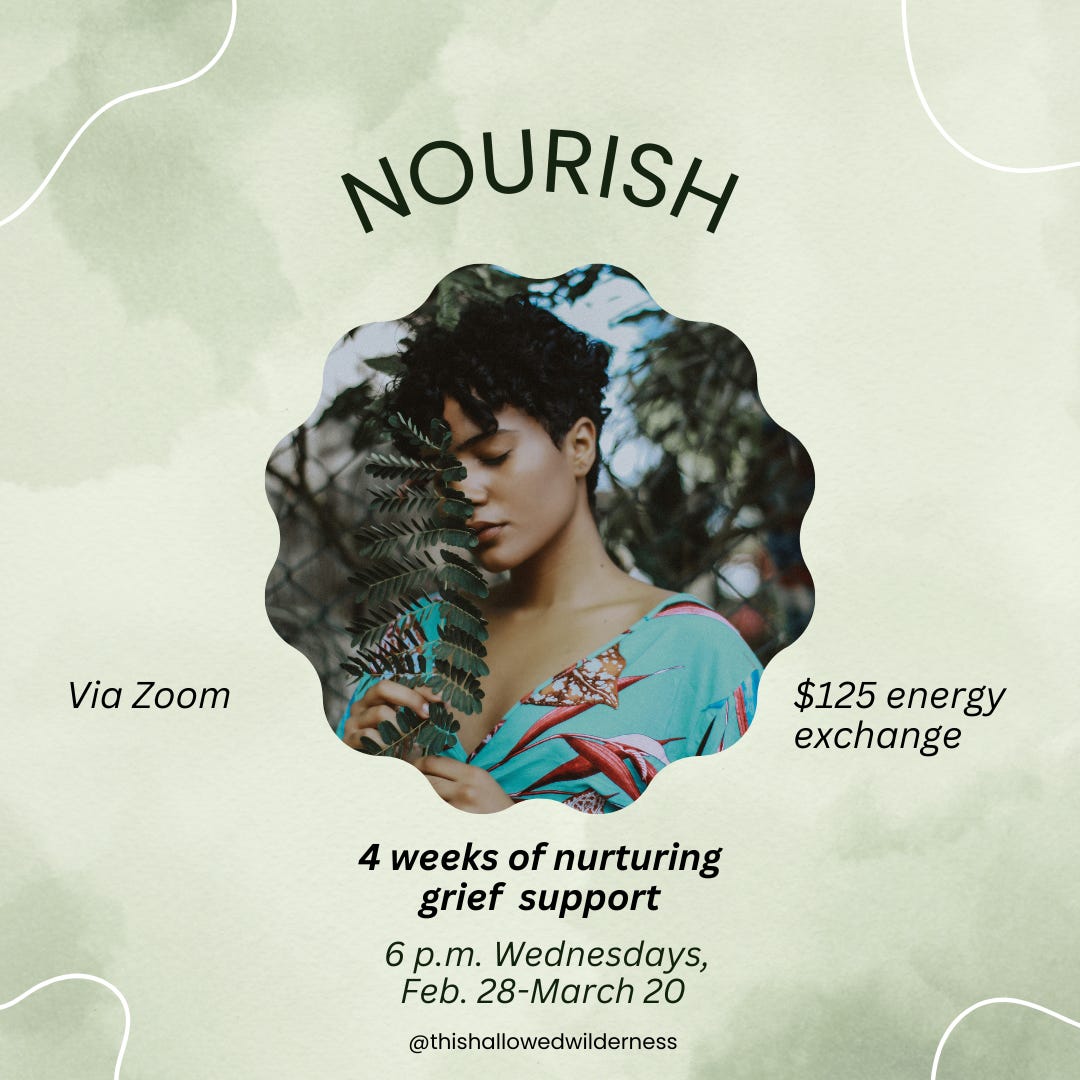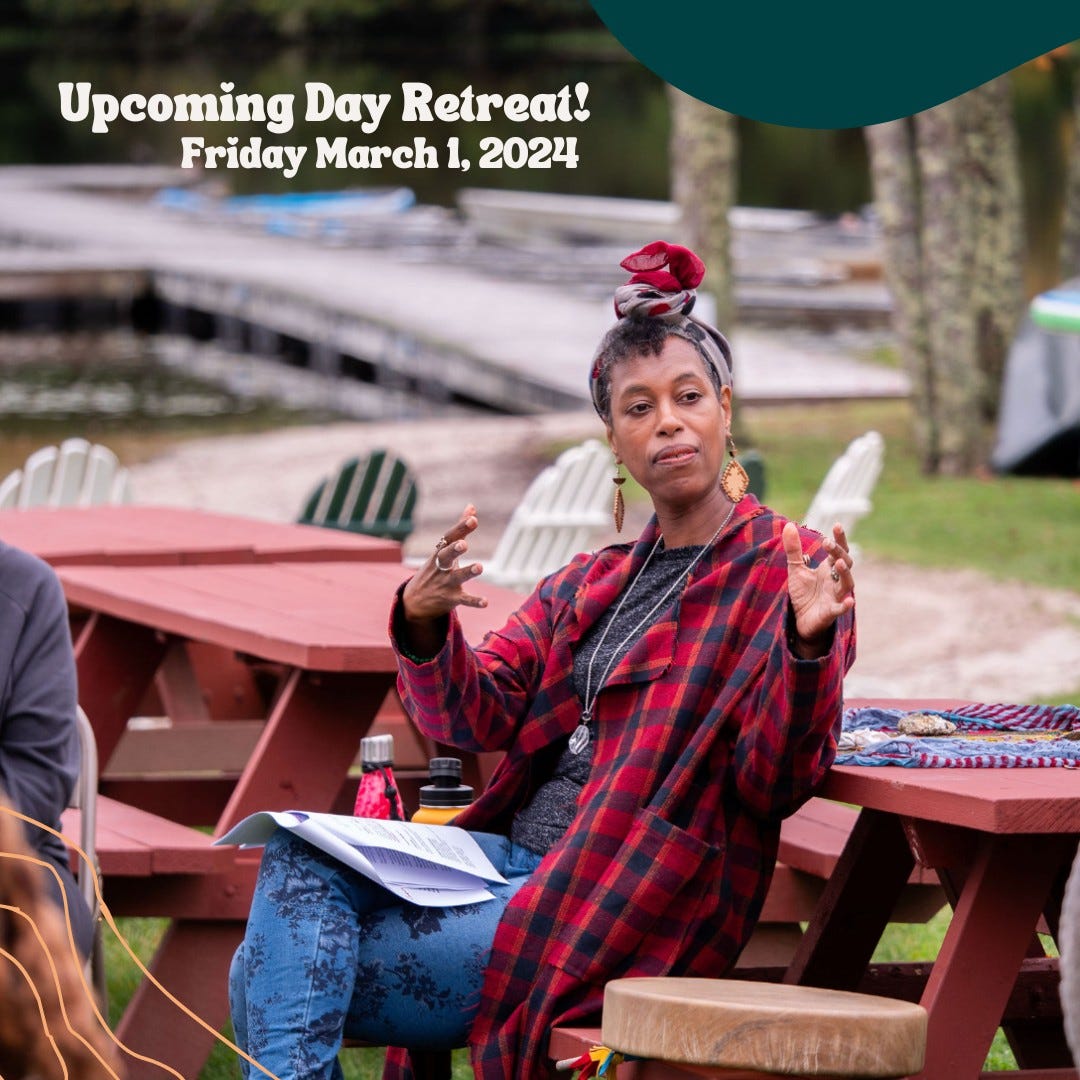Grief is meant to re-arrange us
What are the new forms and layers you're being called to inhabit?
I wasn't expecting it. But then again, can we ever know when the vagaries of grief will slip into a moment of joy to bruise the swell of its sweetness? Become a clenching in our guts carrying us away from center, a catch in our throats in the midst of the soft music we’re learning to make from the sharp and strident notes we’ve carried?
When the tears pricked my eyes, threatening a small river as a fierce longing to have my dad in the room swept through me, I was preparing to take the stage with my fellow poets in a performance. We’d been writing together, and sharing the pain and promise of our lives, for two days in an intensive poetry workshop called “Grief, Loss & Good Gains” led by the illustrious Ursula Rucker. And now on the third day, we would be speaking our pieces live before an audience.
Perhaps it was only natural to have that wave of sorrow hit at that particular moment given the subject of our workshop. But the grief I’d been exploring and giving form to that weekend had little to do with the death of my father in 2012. Yes, that loss is always with me, a mellowed yearning that sometimes sears, a tender gratitude braided from our enduring connection though he’s not physically here. Still, that night I was excited, and admittedly a little nervous, when suddenly it hit me, here was another facet of me my dad was not here to witness. Another page in my story unmarked by his presence. A becoming unfurling without his noticing or praise or participation.
I’d been writing poetry when my dad died but aside from a weeklong retreat I’d impulsively signed up for — one he’d been proud to know I was attending — my poetry practice was mostly a solitary and private affair. I shared my poems with a trusted circle of friends and occasionally, when invited, with the spiritual community I belonged to at the time. But I didn’t dare call myself a poet. Did not approach the craft with true devotion or discipline (the latter, I confess, is still a work-in-progress). And I certainly had no desire to find a more public forum or communal space to cultivate this expression.
My dad and I did not talk about poetry, mine or others. I did not share the poets on my ever-growing list of favorites with him, and aside from the few occasional rhyming lines in a card or letter (and what I’d enthusiastically penned and gifted as a young girl), I kept my own works far from his eyes. I would share articles I wrote while making my living as a journalist then, but I often felt my career in writing had fallen short of his many dreams for me. And an offering of my poems seemed too vulnerable a space to enter with him. Yet my dad was also the one to gift me books of poetry by Caribbean writers like Jamaica’s Lorna Goodison, Barbados’ Kamau Brathwaite and of course St. Lucia’s Derek Walcott, our own Nobel Prize winner whom I had the chance to meet while visiting my dad on the island home he’d returned to after my parents separated.
In an anthology he sent me one year after attending the celebration of its release, he wrote, “I could not help having you in my thoughts through it all. You could easily have penned all what’s written within.”
In the layers of our complicated and strained loving of each other, I couldn’t hold this belief in me. Couldn’t tap into the possibility of joy blooming from a shared appreciation for language when so many of our own words to each other were brooding, bungled things.
Yet there I sat, the tears pooling, the missing a blade in my chest, when I imagined sharing our “Grief, Loss & Good Gains” performance with him.
I have written so many poems since you died, Dad. I can now claim the title “poet” without shrinking back. I wish you were here to see me, to celebrate this moment with me. My life is so different than what you knew. There are dozens of paths I’ve walked to shape this woman, and I’ve travel them all without your wisdom, your worry, your marvel and delight.
This is one of the relentless pangs many grievers experience. Even as we start to metabolize our grief, as it becomes something softer and less destabilizing, as we start to trust ourselves again and open to life with new curiosity and vitality, there is the sense that we are growing away from who our person knew us to be. That in our evolution and emergence, we are perhaps closing a door to them, turning a corner where they cannot follow. Even as we relish some of these new directions, tend to materializing parts of ourselves with fervor and commitment, there are thousands of moments we will create and enter, shaped and shifted by our grief, that they will never get to witness. And that can be scary and unsettling.
Some will resist doing their healing work to hold onto who they know themselves to be — and who their person loved. Some will sabotage the steps that carry them forward, begin to unlock the stories where they’ve been hiding. And some may keep spinning, cycling through the same patterns to avoid, consciously or unconsciously, making the changes they claim to want.
But grief is meant to re-arrange us. We cannot be touched by the harrowing hands of loss and remain who we are. We are called to inhabit new forms, new layers and to let others go. To relax our grip on control and trust what wants our attention in the unmooring. There is nothing stagnant about the energy of grief. Its feral nature, insistent clamor and chaotic movements are invitations to transform.
How can we make a welcome space for that transformation? What would it look like to walk through the unknown with care, community and support, and how willing are we to lean into that nourishment? What do we need to surrender at the edge of who we are and who we are becoming, even if we can’t know who that is?
Of course, I wish my dad were here. I want him to see what’s fruited in this life, how I’ve given myself to gifts and experiences and places that over and over again help me claim my existence. My refusal to be made small by grief. To live diminished in its shadow.
And this is both the sorrow and the balm, the wishing he were here and the knowing that his death seeded so much of my journey to now, to me becoming more fully me. To living with a presence and aliveness midwifed through the long dark of grieving.
I also know my dad has had an even greater view to all of this. That because I find ways to stay connected to him (see this Instagram post as one example), he knows who I am and will be there through the evolving.
Will that ache of missing him ever go away? Probably not, but the ache and my willingness to feel it, are also what let him in. Draw him close so that we may keep tending our relationship, reveal ourselves to each other in ways more nurturing than we were able to before he died.
I am thinking of these lines from the poet John Roedel in his piece about grief’s alchemical nature:
“grief is the fluttering
inside of us that
reminds the world
that although our
world has burned
down to the roots
that there is still
life within us
and if we can hold
on long enough
life will eventually start pouring
out of all of our smoldering wounds.”
The pouring out may hurt, but in it we find new gifts, insights and shapes of being, a generative force that reminds us, as Ursula also did in our workshop, that we’re still here.
Still breathing.
Still loving.
Still here.
Upcoming Offerings
There’s still time to join me for this in-person class on Wednesday at Mt. Airy Learning Tree in Philadelphia. Through poetry, writing prompts and the witnessing of each other's stories, we'll make space for our grief ... and what it needs from us. No writing or poetry experience necessary. The focus here isn't on craft but on using poems as a place to access our grief...and then resting what's in our hearts on the page through guided writing prompts. Register here.
Join me in this weekly virtual space where we will tend our grief together — offering it our gentle attention and care, alongside practices, inquiries, framings and encouragements to soften into what feels hard; open where we are closed; and cultivate a welcoming warmth for our grief. Sessions will include poetry, writing and art-making, guided meditations/grounding exercises, ritual and group sharing/reflection. All griefs are welcome, as we navigate the inner and outer landscapes of these times, holding them as inseparable.
Sessions will take place via Zoom starting Wednesday, Feb. 28, from 6 - 7:30 p.m. EST, and will run at the same time every Wednesday through March 20. Zoom link will be sent upon registration. Energy exchange is $125 for all four weeks.
Sign up here.
Grief invites us to get comfortable with darkness. The darkness of not knowing, the darkness where we might encounter fear and worry, where we may feel lost and lonely… where we might begin to contemplate our own mortality and the impermanence that is an inevitable part of living…where we might also begin to question how we’ve been living our lives and what we might wish to do differently. It can be incredibly uncomfortable to let ourselves make this journey into the depths but this space can also be generative.
As we begin to make our way toward Spring, join me for the daylong in-person retreat, “Harvesting Hope: Gifts From Grief,” from 9:30 a.m. to 4:30 p.m. Friday March 1 in beautiful New Hope, Pa.
At this Rise Gatherings experience, we’ll explore the ways we’re learning to see in the dark and look for what may be sprouting there. What are the shifts, the ripenings, the openings that will allow us to carry our grief with more softness and compassion into a new season?
This intimate retreat will include forest bathing, lunch and the workshop experience. Cost is $249.
Register here.
A meditation to connect to your loved one
Enjoy this gentle invitation to help your loved one meet the present-moment you. You may wish to have a journal on hand to jot down anything you wish to remember from the experience.








I love this so much Naila. It brings up a similar dynamic with parents and i loved the reminder that they now see it through the lens of pure love. 🥰